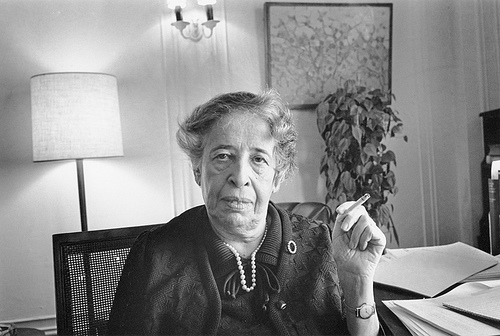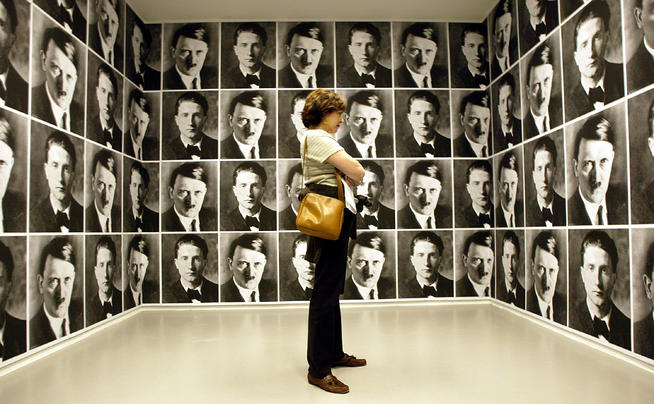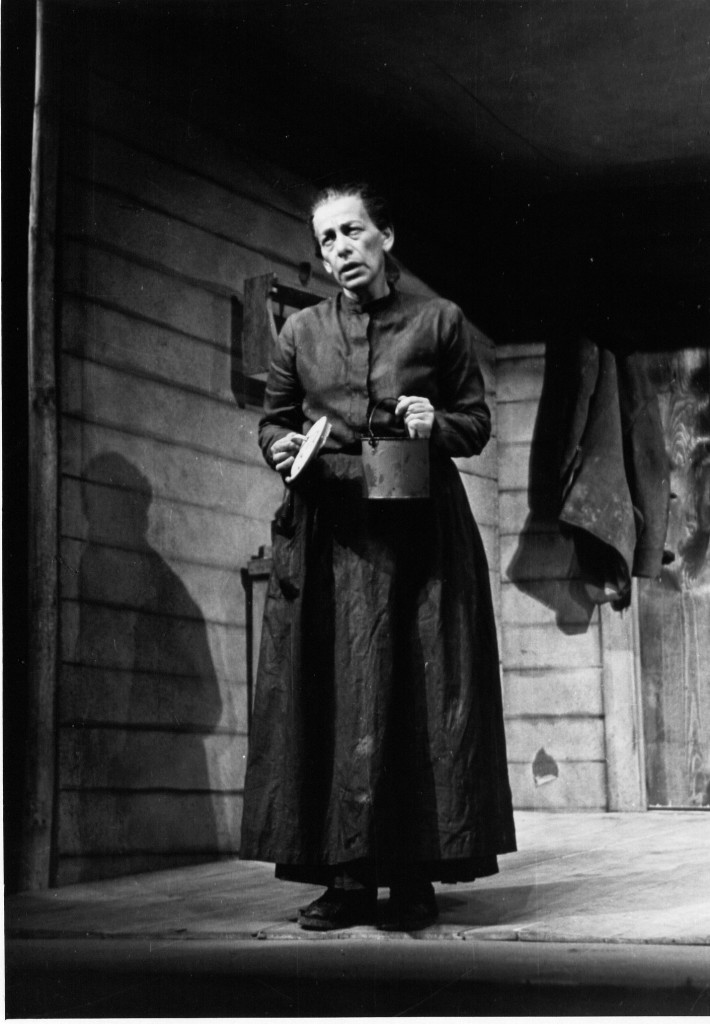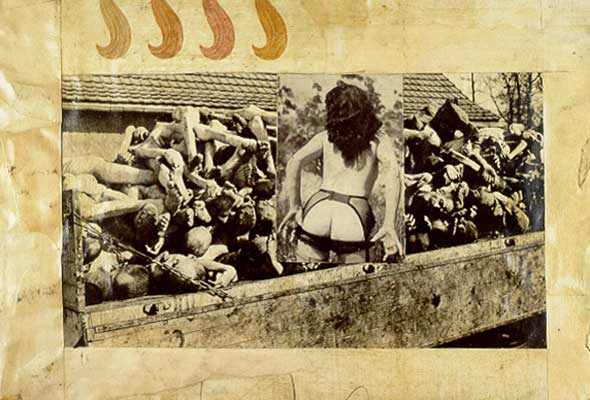A relationship of power and violence and how they are inversely proportional. Or so said Hannah Arendt which could well constitute a pillar in her own inversely proportional posthumous power and the violence that has fed on her words thorugh a juggling of contexts, rhetorical flourishes and outright exaggeration that feed off Arendt’s own paradoxes. like Brecht’s Mother Courage she is at heart, a sympathetic character, though, like Mother she sold goods to competing armies and could bring about the death of her own children. Ardent Zionist, then Heidegger induced Damascus Road Conversion to proto-radical Leftist.
Arendt was critical of the nature and conduct of the Eichmann trial, putting it into the same realm as a Stalinist show trial, except this one inhabited by Yidden with ghetto mentality. She attacked the proceedings of the trial because the testimony of most of the witnesses had little to with Eichmann directly. She missed the point. Eichmann was a sideshow, a pretext to deal with what had been an inexpressed national trauma touching the nerve of the Jewish existential question. For Arendt, th hyper-secular rationalist the purpose of the exercise was to see justice done.She should have rejoiced that what had been designed as useful for Israel’s national interests should turn back on Labor Zionism by dragging the Transfer Agreement and the Kastner episode in Hungary back on the table, force feeding the government with unsavoury leftovers. One gets the impression that Arendt that subconsciously she was turning herself in by ging to Jerusalem with a looking back over her shoulder to see if someone was not going lower her into a ritual bath head first. Arendt was the precursor of the post-Jew, the ones who somehow can,t contain the nagging sentiment that their lineage is an unfortunate birth defect.

—The most biting criticism came from the renowned scholar, and her friend, Gershom Scholem. He accused Arendt for her “heartless, frequently almost sneering and malicious tone,” and her account which ceased to be objective and “acquires overtones of malice.” Scholem wrote that in the Jewish tradition there is a concept, Ahabath Israel, love of the Jewish people. In a devastating remark he said “In you, dear Hannah… I find little trace of this.”
Read more: http://www.americanthinker.com/2013/05/the_question_of_evil_and_hannah_arendt.html#ixzz2VWxw6vlW
—click image for source…
(see link at end)…Hanna Arendt, is a film with a limited scope, following Arendt during the publication of her book Eichmann in Jerusalem in 1963. The film stacks the deck decidedly in its protagonist’s favor, but its methods expose the threadbare hero it hallows. Eschewing any serious consideration of the sustained critical response to Eichmann in Jerusalem, Hannah Arendt prefers hagiography. It is a one-sided argument, so intent on ensuring Arendt’s victory that it adulterates the very nature of the conflict over Eichmann, and over the legacy of Arendt’s thought.
Arendt’s primary purpose in Eichmann, a book that emerged from a series of New Yorker pieces, was to demonstrate “the banality of evil”—the ways in which a simple Nazi clerk could play handmaiden to mass murder without ever understanding or acknowledging the horror of his deeds. Eichmann, by her reckoning, bore the Jews no special animus, intent merely on carrying out his duties to the utmost.
…Arendt’s most controversial assertion in the book was that the Jewish leaders known as the Judenrat were, to a large degree, complicit in the Holocaust in their cooperation with the Nazi authorities. This, too, has been widely disputed. Tony Judt, in an otherwise admiring essay on Arendt, describes her as “indifferent, perhaps callously so, to the dilemmas Jews faced at the time.”
Hannah Arendt is sympathetic to many of the claims Arendt makes in her notorious book, but it is the film’s handling of the Judenrat controversy (which arose after Arendt’s articles first appeared in The New Yorker) that most clearly demonstrates its allegiance to the myth of Arendt as fearless truth-teller. Forever surrounded by tottering piles of trial transcripts, her opinions are presented here as above debate. “But it’s a fact,” Arendt insists to one of her critics about her Judenrat allegations, puzzled that anyone could take umbrage at her line of argument. Her work is in the service of truth, where others’ is presented as nefarious and self-interested.

—Art, as Arendt understands it, must also be free from its commodification in the art market. When art is commoditized, it is subject to becoming just like any other consumer commodity, which can be purchased, consumed, and therefore destroyed. Still, I don’t believe that an art object’s status as a commodity necessarily disqualifies it from constituting Arendt’s definition as art. As many contemporary critics, such as Diedrich Diedrichsen, have pointed out, art is not a regular commodity, and it is not assigned value or circulated in the same way, even if it is given a price tag.—click image for source…
Arendt’s tormentors here are bullies, shrill ideologues who value politesse over honesty. They are embodied by the rat-faced fellow academic who scowls at each of Arendt’s orotund pronouncements and hisses at her conclusions. (Subtle this film is not.) Arendt argues that the bulk of her critics are “dimwits” who likely have not even read her articles. The film relentlessly endorses her unlikely assertion; the critics of Eichmann in Jerusalem are crank callers and the elderly neighbor who sends Arendt a profane message. No one is allowed to calmly rebut her, or to voice the obvious critiques of Arendt’s work: that it was indifferent journalism, that its philosophical bent amounted to a defense of Eichmann (as Judt put it, “Jews seemed to become ‘responsible,’ Germans merely ‘banal’”), that its attacks on the Judenrat emerged less from the historical record than Arendt’s own deeply conflicted relation to Judaism as a self-identified scholar and representative of German high culture. And thus the cinematic Arendt blithely carries on, oblivious to the attacks, calmly assured that she need listen to them no more than her critics have apparently listened to her. The film inoculates its protagonist, placing accusations of coldness, lingering Germanophilia, and disregard of anti-Semitism in the mouths of unsympathetic or intellectually insignificant characters.

Hannah Arendt on Brecht:This does not mean that Brecht had no sense of tradition; he simply
did not believe in it any longer. His masterful, elaborate parodies (see
“Litany of Breath” and “Grand Chorale of Thanksgiving” in this selection
and the choruses in the play Die Heilige Johanna der Schlachthoefe)
would defeat their own purpose if they were simply parody. Brecht’s
travesty has many meanings and many purposes: it forces open the old
forms by adapting them to a new, revolutionary content, and thereby not
only destroys but also preserves; it shows by its very mastery that every
poet worthy of the name must, as a matter of craftsmanship, know how to
handle the traditional forms; but it also contains a definite destructive
element: the new content given traditional forms is meant to expose the
old poets, to reveal what they did not say, to unmask their silence….click image for source…
In the film’s strangest, quasi-surreal touch, Arendt is stopped on a lonely, deserted road by a trio of Mossad agents. They seek to intimidate her into withholding publication of Eichmann in Jerusalem, insisting on its potential harmfulness. “You burn books,” Arendt scoffs, “and you lecture me.” The reference is deliberately
nted; Israelis are the new Nazis, using force to demand acquiescence from their enemies.The scene echoes Hannah Arendt’s first scene, in which Eichmann is snatched off a similarly deserted Argentinean road. Are Arendt and Eichmann both victims of the same heavy-handed rush to judgment? Like Arendt, the film seems to jumble Nazi and Jew, killer and killed, so thoroughly that it confuses itself about which side is which. This is, to say the least, deeply troubling. Arendt’s intellectual triumph seems to require the rhetorical immolation of all rivals, including the State of Israel. Read More:http://mosaicmagazine.com/picks/2013/06/idolizing-hannah-arendt/
Arendt’s assertion of Jewish complicity, some innate gene of nihilistic desire is at best, a cheap shot, disconnected from reality delivered with the coldness of a Nazi ideologue pinching phrases from Alfred Rosenberg. Given the anguish of Jews under Stalin how much more of a challenge could it have been to keep hold oneself under the weight of the Nazis who were way more efficient and precise than the Russians? The miracle is that there was resistence, some kind of functioning organization and a semblance of leadership despite its failings. For Arendt, there is no intermediate area of experience here, emotionally or intellectually, in which differences are muted without being denied and objectivity becomes a by-product and not an ideology that attacks a romancing of the trial atmosphere negating her own subjective investment under the objective magnifying glass of justice.

—The negative identity is permanently at odds with the world, and negates it every chance it gets. It becomes a mode of “catastrophizing,” as the cognitive psychologist Aaron Beck calls it. It is an identity made all the more negative, as it was in Lurie’s case, when it has been conceived under duress: the duress of the Holocaust—an actual not a fantasied catastrophe–which left its indelible traumatic mark on Lurie. I will argue that his art was his way of coming to terms with the Holocaust and its unavoidably traumatizing effect on him. A trauma involves a break in the continuity of existence, as Winnicott said, and the concentration camp was a break in the continuity of Lurie’s existence, as the Holocaust was a break in the continuity of Jewish existence.—click image for source…
But this world that Arendt describes seems disconcertingly unreal. It is near impossible to reconcile ourselves to a situation where a subjective foothold is not attainable. Eichmann in a glass cage is like a madame Tussaud museum piece, not really alive and not really decaying. An artificial world of the neat, clinical and empty one of which the core of subjective nuance is absent producing an effect of radical banality. Her book is a masterpiece, albeit a chef-d’oeuvre of indifference with an almost sadistic relish at the impoverishment of a poor society, and when she does attempt to reflect an inner reality, it remains unconvincing and superficial, the holocaust, Eichmann, survivors, “useful idiots” in her own search for self. Eichmann, like the Jews are a token presence, metaphorically invisible and lacking individuality and depth. Maybe, by accident, Arendt conveys the impersonal essence of the modern world and her form of standardized objectivity is not dissimilar to Riefenstahl; the same aura of empiricism and unyielding alienness that dredges up the image of the Jew as hysterical, effeminate and biologically not up to the standards of post-modernisms clinical, artificial environment, or ultimately, deserving of nationhood.





 COMMENTS
COMMENTS